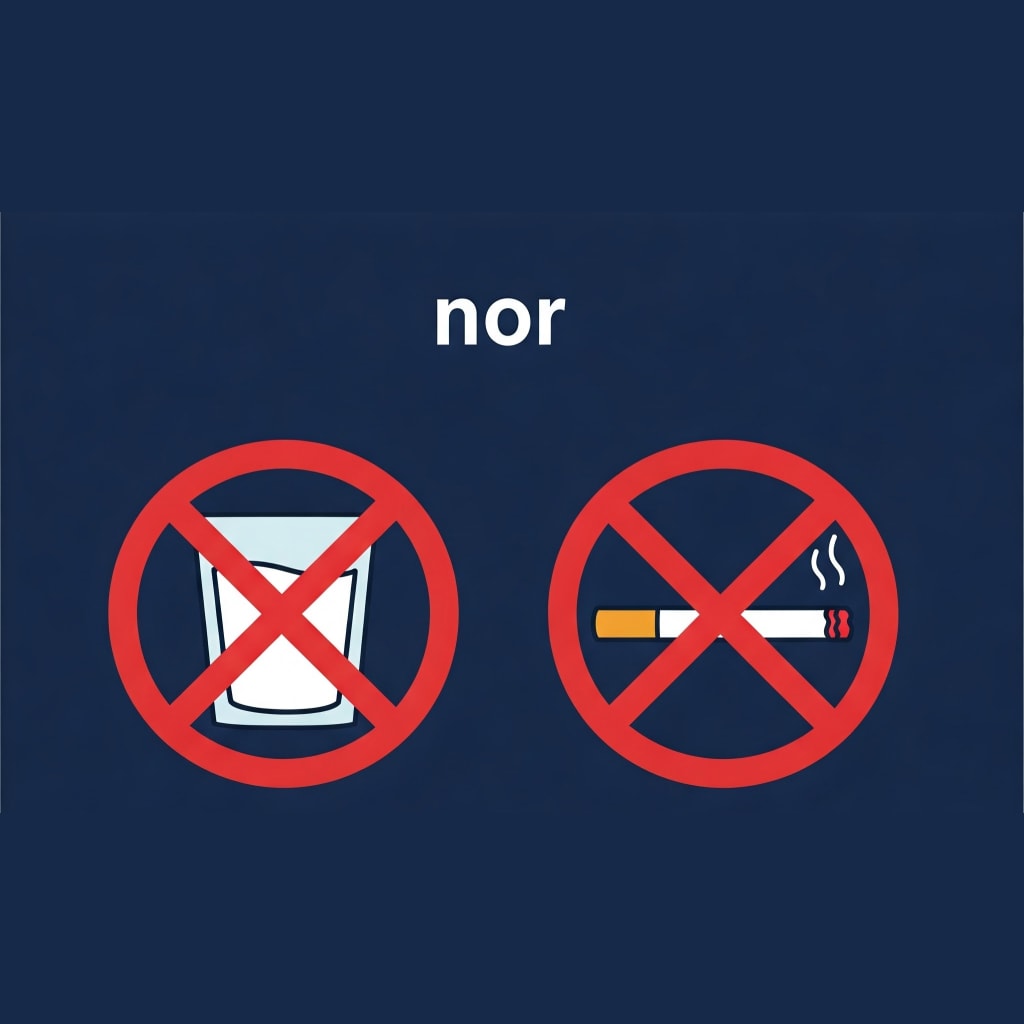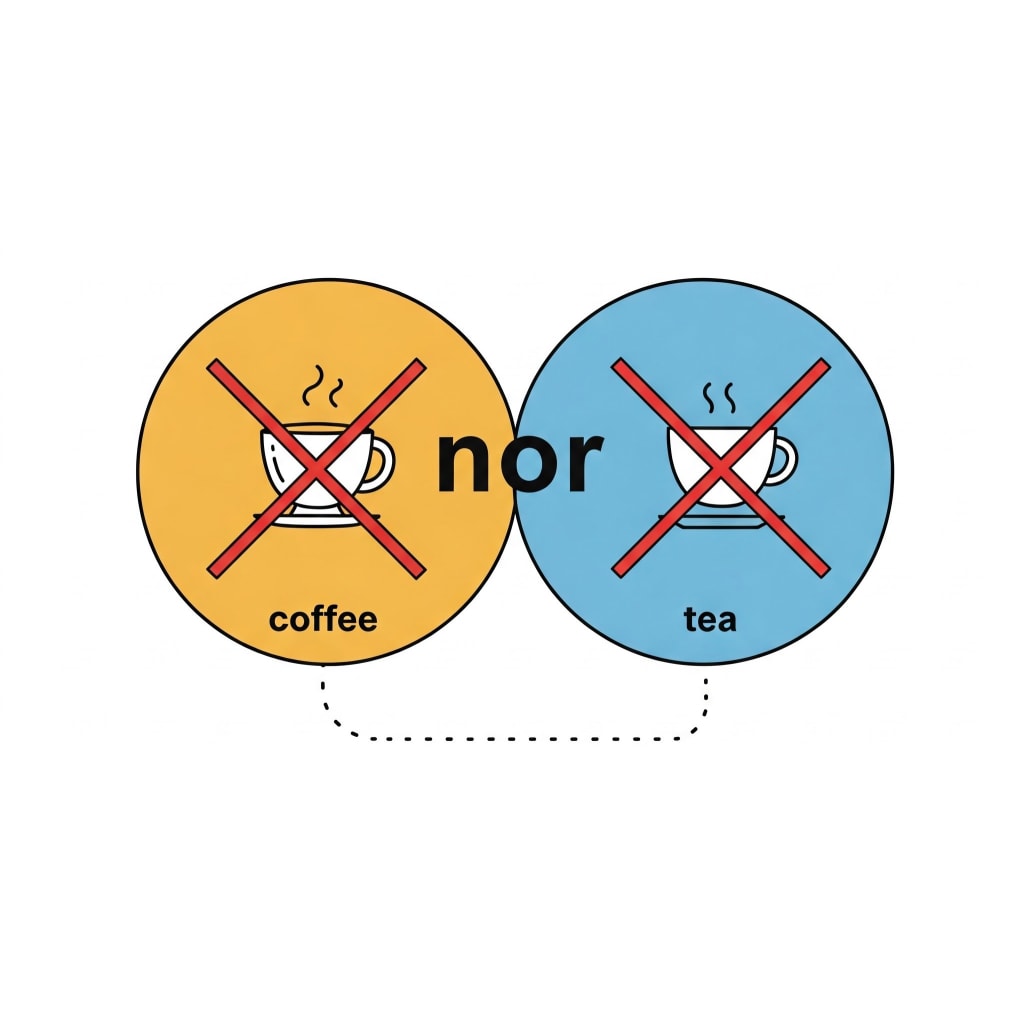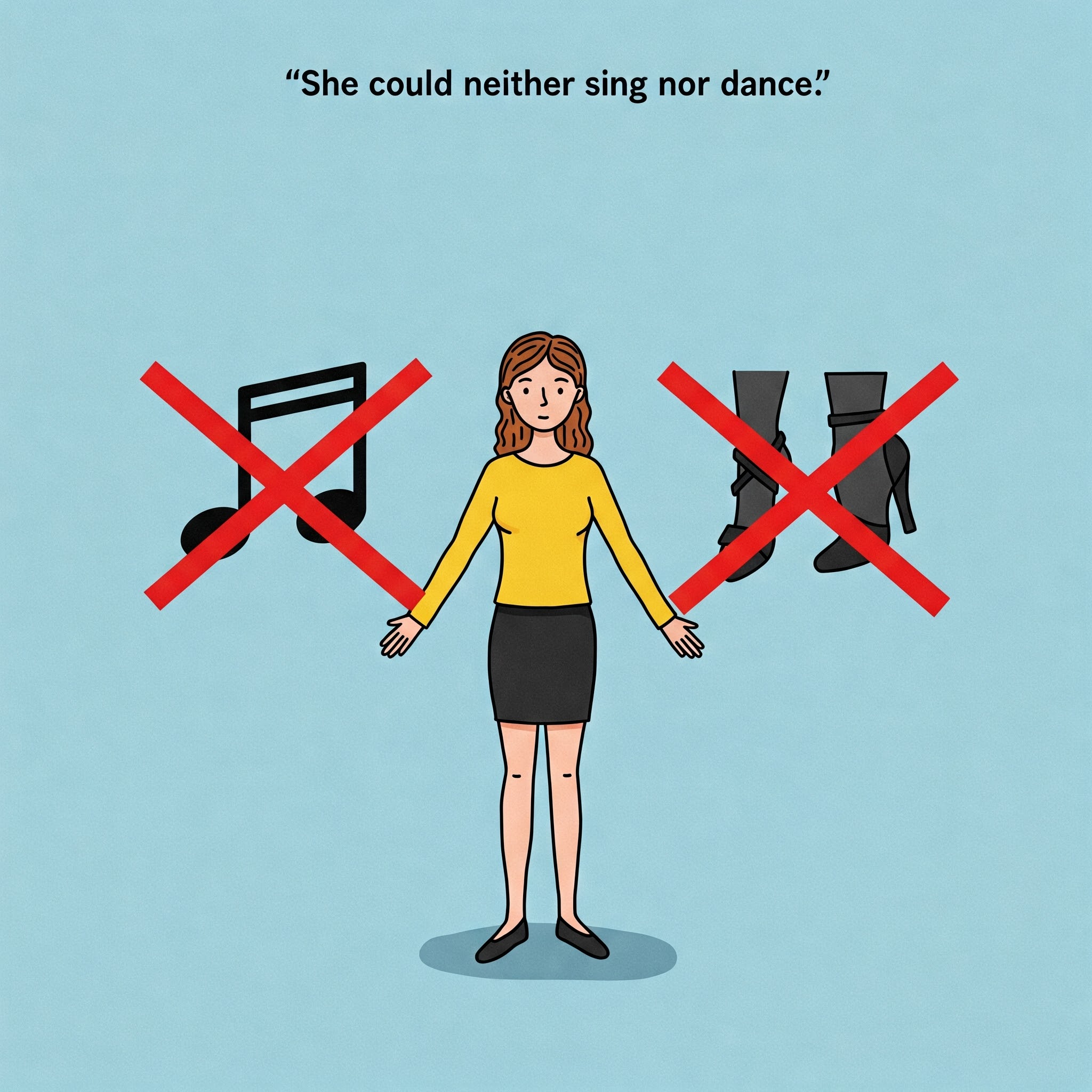Nor
Definition
Nor is a conjunction. It is used to introduce the second or subsequent negative statement or clause, typically in connection with "neither."
Parts of Speech
- Conjunction
Pronunciation
American English
- IPA Pronunciation: /nɔːr/
- Respelling: nor
British English
- IPA Pronunciation: /nɔː/
- Respelling: nor
Etymology
The word "nor" originates from Middle English, derived from Old Norse "nor," a contraction of "ne oþer," meaning "neither one nor the other." Its use became standardized in conjunction with "neither" over time.
Derivatives
- Nor'easter (noun, regional dialect)
- Neither-nor (phrase)
- Nor-any (phrase)
- Nor-yet (phrase)
- Nor-but (archaic conjunction)
Synonyms
- Neither
- Not one
- Nor yet
Antonyms
- Or
- And
- Either
Usage
The term "nor" is often used in formal or literary contexts to join two or more negative statements. For example, "She could neither sing nor dance," or "He didn’t call, nor did he write."
Related Terms
- Neither: Used in negative statements to indicate not one or the other.
- Or: Used to connect alternatives.
- And: Used to connect words or phrases of the same clause.
Detailed Definitions
Conjunction
- Used to introduce the second or subsequent clause of a negative statement:
- Example: "He neither drank nor smoked."
- Used after a negative statement to continue the negation in another clause:
- Example: "She doesn’t like coffee, nor does she enjoy tea."
nor



🇨🇳 Mandarin Chinese
- 也不 (nor)
- IPA: /jɛ˥ pu˥˥/
- English Respelling: ye bu
- 亦非 (nor, formal)
- IPA: /i˥˥ feɪ˥/
- English Respelling: yi fei
🇮🇳 Hindi
- न (nor)
- IPA: /naː/
- English Respelling: na
- और नहीं (and not)
- IPA: /ɔːr nə.ɦiːn/
- English Respelling: aur nahin
🇪🇸 Spanish
- Ni (nor)
- IPA: /ni/
- English Respelling: ni
- Tampoco (neither)
- IPA: /tamˈpoko/
- English Respelling: tam-po-ko
🇫🇷 French
- Ni (nor)
- IPA: /ni/
- English Respelling: ni
- Non plus (neither)
- IPA: /nɔ̃ ply/
- English Respelling: non plu
🇦🇪 Modern Standard Arabic
- ولا (nor)
- IPA: /wala/
- English Respelling: wala
- ولم (and not, used before a verb)
- IPA: /walam/
- English Respelling: walam
🇧🇩 Bengali
- না (nor)
- IPA: /naː/
- English Respelling: na
- এবং না (and not)
- IPA: /ebɔŋ naː/
- English Respelling: ebong na
🇷🇺 Russian
- Ни (nor)
- IPA: /nʲi/
- English Respelling: ni
- Также не (also not)
- IPA: /ˈtakʐɪ nʲe/
- English Respelling: takzhe nye
🇵🇹 Portuguese
- Nem (nor)
- IPA: /nẽj̃/
- English Respelling: nem
- E também não (and also not)
- IPA: /i tɐ̃ˈbẽj̃ nɐ̃w̃/
- English Respelling: e tam-bem nao
🇮🇩 Indonesian
- Atau tidak (nor)
- IPA: /aˈtau tiˈdak/
- English Respelling: atau ti-dak
- Juga tidak (also not)
- IPA: /ˈdʒuga tiˈdak/
- English Respelling: juga ti-dak
🇩🇪 German
- Noch (nor)
- IPA: /nɔx/
- English Respelling: noch
- Und auch nicht (and also not)
- IPA: /ʊnt aʊx nɪçt/
- English Respelling: und auch nicht
🇯🇵 Japanese
- また (nor)
- IPA: /ma.ta/
- English Respelling: mata
- そしてない (and not)
- IPA: /soɕite nai/
- English Respelling: soshite nai
🇻🇳 Vietnamese
- Cũng không (nor)
- IPA: /kəwŋm˧ˀ˨ʔ kʰawŋm˧ˀ˨ʔ/
- English Respelling: cung khong
- Và cũng không (and also not)
- IPA: /vaː kəwŋm˧ˀ˨ʔ kʰawŋm˧ˀ˨ʔ/
- English Respelling: va cung khong
🇰🇷 Korean
- 도 (nor, used after a noun or pronoun)
- IPA: /do/
- English Respelling: do
- 그리고도 아니 (and also not)
- IPA: /ɡɯɾiɡodo ani/
- English Respelling: geu-ri-go-do a-ni
🇹🇷 Turkish
- Ne (nor)
- IPA: /ne/
- English Respelling: ne
- Ve de (and also not)
- IPA: /ve de/
- English Respelling: ve de
🇵🇰 Urdu
- نہ (nor)
- IPA: /nə/
- English Respelling: na
- اور نہیں (and not)
- IPA: /ɔːr nə.ɦiːn/
- English Respelling: aur nahin





